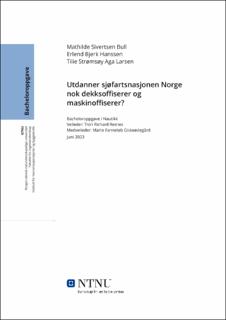| dc.contributor.advisor | Resnes, Tron Richard | |
| dc.contributor.advisor | Giskeødegård, Marte Fanneløb | |
| dc.contributor.author | Bull, Mathilde Sivertsen | |
| dc.contributor.author | Hanssen, Erlend Bjerk | |
| dc.contributor.author | Larsen, Tilie Strømsøy Aga | |
| dc.date.accessioned | 2023-07-18T17:20:28Z | |
| dc.date.available | 2023-07-18T17:20:28Z | |
| dc.date.issued | 2023 | |
| dc.identifier | no.ntnu:inspera:146718194:151075525 | |
| dc.identifier.uri | https://hdl.handle.net/11250/3080021 | |
| dc.description.abstract | Denne oppgaven spør spørsmålet «Utdanner sjøfartsnasjonen Norge nok dekksoffiserer og maskinoffiserer?». For å forsøke å svare på dette, har 2 forskningsspørsmål vært sentrale:
1. Hva er det estimerte behovet for offiserer i nærmeste framtid?
2. Hvordan er utdanningstilbudet for maritime operative fag på fagskole-, høyskole og universitetsnivå?
Valget falt på kvantitativ metode, og et mindre utvalg kvalitative kilder ble brukt supplerende. For å skape dekkende bakgrunnsforståelse for temaet ble det valgt å sette seg inn i Den internasjonale konvensjon om normer for opplæring, sertifikater og vakthold for sjøfolk, samt det norske lovverket som omhandler sertifiseringen av dekk- og maskinoffiserer. Hovedkildene til undersøkelsen, analysen og drøftingen er fra Samordna Opptak, Direktoratet for høyere utdanning og kompetanse, Baltic and International Maritime Council (BIMCO), International Chamber of Shipping og Sjøfartsdirektoratet.
På bakgrunn av data fra BIMCO, ble det laget et teoretisk estimat for antall offiserer den Norske maritime næringen kommer til å etterspørre innen 2026. Oppgaven konkluderer med at totalt antall studieplasser for dekksoffiserer og maskinoffiserer i Norge ikke møter estimatet. Videre bemerket forfatterne at studietilbudet for maritime operative fag på høyskole- og universitetsnivå kunne med fordel vært større. Dette ble basert på økningen i søkertall til studiene sett i lys av utviklingen i antall studieplasser, samt gjennomføringsgrad av bachelorstudier innen normert tid, og oppmøteantall ved studiestart. Dette poenget gjelder dog kun for høyere utdanning, da forfatterne møtte på uforutsette vanskeligheter med å samle inn reliabel data for alle fagskolene i landet som omhandlet disse punktene. Svaret på problemstillingen presentert over basert på funnene denne oppgaven presenterer, ble at Norge ikke utdanner nok dekksoffiserer og maskinoffiserer. | |
| dc.description.abstract | The following thesis begs the question, “Does the seafaring nation of Norway produce enough deck officers and engine officers?”. In the endeavor to answer this, two main research questions have been applied:
1. What is the estimated demand for deck and engine officers in the near future?
2. What are the education offers for operational maritime studies at trade schools, colleges, and universities?
The writers chose quantitative research methods and supplementally used a limited set of qualitative sources. In order to form a sufficient understanding of the subject, the writes chose to deepen their knowledge of the International Convention on Standards of Training, Certification and Watchkeeping for Seafarers, and the local laws and regulations in regards to the certification requirements of deck officers and engine officers. The main sources for the thesis were the Norwegian Universities and Colleges Admission Service, the Norwegian Directorate for Higher Education and Skills, the Baltic and International Maritime Council (BIMCO), the International Chamber of Shipping and the Norwegian Maritime Authority.
Based on figures from BIMCO, a theoretical estimation of future demand for deck and engine officers by 2026 in the Norwegian maritime industry was created. The thesis concludes that the total number of available admissions is far lower than the estimate suggests will be needed in the near future. Furthermore, the writers note that maritime study programs at universities and colleges have the potential to increase their number of admissions. This was based on an observation of the growth in applications to said study programs, compared to the number of available admissions, the percentage of graduations within 3 years, and the number of students who attend at the start of the first semester. This note is however only applicable to colleges and universities, as the writers faced challenges in collecting reliable data for trade schools pertaining to these factors. The answer to the overall question that the thesis asked, is that no, Norway does not produce enough deck officers and engine officers. | |
| dc.language | nob | |
| dc.publisher | NTNU | |
| dc.title | Utdanner sjøfartsnasjonen Norge nok dekksoffiserer og maskinoffiserer? | |
| dc.type | Bachelor thesis | |
